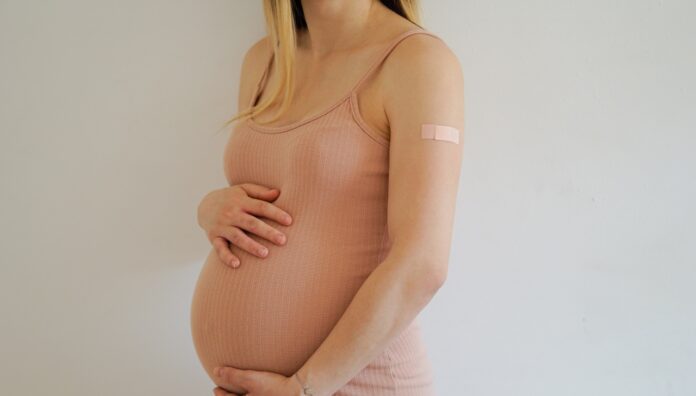Since 1 December 2024, Queensland-based pharmacists have been able to administer Abrysvo to pregnant patients to protect infants from severe Respiratory Syncytial Virus (RSV), following an expansion to the Queensland Paediatric Respiratory Syncytial Virus Prevention Program.
While Abrysvo will be added to the National Immunisation Program (NIP), as per the federal government’s announcement last month, the vaccine is currently funded by the Queensland government – although the administration fee is not covered at this stage.
But given Abrysvo is a relatively new vaccine, pharmacists will need to factor in pregnancy risk perception into strategies to encourage vaccine uptake.
After vaccinating her first patient against RSV, community pharmacist Anna Chang MPS, based in Brisbane, told Australian Pharmacist what should be considered.
Know how the vaccine needs to be prepared
The mixing instructions for Abrysvo are ‘unique’, said Ms Chang.
The vaccine comes with a lyophilised vaccine powder (vial), vial adapter and pre-filled syringe containing diluent. To prepare the vaccine, the vial adapter must be attached by centering it over the vial stopper and pushing straight down to avoid leaks.
Using a syringe held by the Luer lock adapter, the vial adapter must then be connected – with the entire diluent injected into the vial.
After swirling the vial until the powder is fully dissolved, the vial must be inverted and the complete 0.5 mL dose withdrawn into the syringe. Once the adapter is disconnected and a sterile needle attached, the vaccine is ready for intramuscular injection.
‘I haven’t seen a vaccine that is the same as this,’ she said. ‘We all had to look at the instruction sheet line by line and work it out.’
Take a strategic approach to opportunistic vaccination
Vaccination against RSV is recommended for pregnant patients at 28 to 36 weeks gestation. With the pertussis vaccine recommended at 20–32 weeks gestation, this is an opportune time to discuss protection against RSV.
Noting that a pregnant patient was booked in for a whooping cough vaccine at 31 weeks gestation, the week before her pharmacy received stock of Abrysvo, Ms Chang opted to take this approach.
‘I had her name in my calendar to call her and check if she wanted it when I actually got the stock,’ she said.
After receiving the green light from her obstetrician, the patient came back in 2 weeks after receiving her whooping cough vaccine.
‘The obstetrician wasn’t [promoting] it yet, so she [had to] ask if she should get it or not,’ said Ms Chang. ‘And for the cost saving she thought, “Why not go ahead?’”
At the moment, Ms Chang’s team is letting pregnant patients booked in for other vaccines know that funded Abrysvo vaccines are now available in community pharmacies.
‘We have been doing quite a bit of NIP [funded] whooping cough vaccinations for pregnant patients, so they are [ideal candidates],’ said Ms Chang.
Abrysvo can be co-administered with the whooping cough vaccine, if within the right window (28–32 weeks gestation).
‘We will [also] offer for them to come back the next week, but you still have to make sure not to leave it too late,’ she said.
What to do if the vaccine window is missed
While Abrysvo can be administered beyond 36 weeks gestation, infants are unlikely to be adequately protected unless they are born at least 2 weeks after their mother received the vaccine.
‘If you get the vaccine earlier you’re covered if you have a premature baby,’ Ms Chang added.
‘And if you do miss that window and go past 36 weeks or have a premature baby, the baby can still be vaccinated [with nirsevimab] instead.’
The need for newborn vaccination is determined by if and when the pregnant woman received the RSV vaccine, said Ms Chang.
‘They should be asked to advise their obstetrician, midwife or the hospital of receiving the vaccine,’ she added.
Spread the word among other healthcare professionals
While Ms Chang thinks there has been more media coverage of RSV vaccination in 2024, there is unlikely to be widespread awareness of its availability, and benefits.
‘People talk a lot about the flu vaccine and COVID-19 vaccines, but RSV vaccination is [somewhat] new,’ she said.
Pharmacists can discuss the importance of RSV vaccination in pregnancy by letting patients know that it protects infants against severe RSV disease when they are most susceptible, with a clinical trial finding vaccine efficacy of 57% against hospitalisation for RSV for up to 6 months.
But pregnant patients may need assurance from multiple trusted healthcare sources that it’s safe to get vaccinated against RSV, advised Ms Chang.
‘I’ve sent letters to the nearby obstetricians to let them know that we’re [offering this vaccine],’ she said. ‘And in the new year we will let the GPs know.’
Be prepared to answer patients’ questions
Along with queries about vaccine efficacy and timeframe, pregnant patients may want to know about the potential adverse effects.
According to clinical trials, ‘very common’ adverse events include headache, myalgia and injection site pain.
Vaccination might provide protection for pregnant women against RSV disease. However, RSV is typically mild in adults, and clinical trials have not specifically assessed the vaccine’s efficacy in protecting the mother.
‘[While] there is no data available on the duration of antibodies for the women, [pharmacists could] advise [patients] that it has shown to give protection for 12–16 months for older adults in the clinical studies.’



 Professor Margie Danchin[/caption]
Professor Margie Danchin[/caption]

 Dr Peter Tenni[/caption]
Dr Peter Tenni[/caption]
 How should we deprescribe gabapentinoids, according to the Maudsley Deprescribing Guidelines[/caption]
How should we deprescribe gabapentinoids, according to the Maudsley Deprescribing Guidelines[/caption]



 Pharmacists have always prescribed, but they have the potential to prescribe much more
Pharmacists have always prescribed, but they have the potential to prescribe much more




